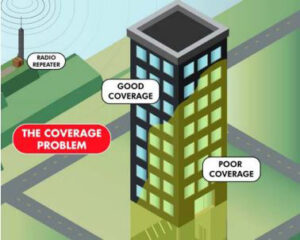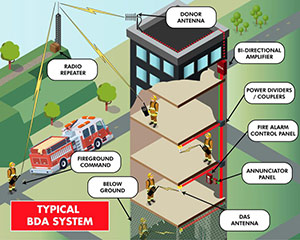Uncategorized
Emergency Responder Communications Enhancement Systems (ERCES) and Why You Need an FCC GROL
Why you need an FCC General Radio Operator License…
In-building emergency responder radio systems (ERCES) or commonly referred to as a Bi-Directional Amplifier (BDA) systems are essential to enable communications between emergency responders in and around buildings during dangerous and emergency situations. Repeaters, transmitters, signal boosters, receivers, operational consoles, remote annunciators, battery charging system components, and power supply can all be parts (in combination or in whole) of these systems.
After the attacks on the World Trade Center on September 11th, 2001, new regulations were established that included those of BDA/ERCES systems in order to help facilitate the evacuation and communication between on-scene emergency responders. In everyday and emergency situations, reliable two-way radio communication is crucial for both the rescue and safety of lives. Following 9/11, the National Institute of Standards and Technology’s (NIST), with support and funding from the U.S. Congress through FEMA, conducted a building and fire safety investigation of the World Trade Center. In the report, recommendation 22 was one of their suggestions, and it served as the catalyst for changes to the Codes. As a result of NIST work, a new section 510 requiring approved radio coverage for emergency responders within buildings was included in the 2009 edition of the International Fire Code (IFC).
In the IFC, the word “approved” is defined as “acceptable to the fire code officer.” Federal Communications Commission (FCC) regulations apply to all RF (Radio Frequency) Emitters (any device that emits RF energy), including BDAs/Signal Boosters. Therefore, Section 510.2, provided the minimum acceptable signal criteria that must be attained and maintained, is one able to be used throughout 95% of all areas on each floor of a building. Additionally, all systems need to be set up in line with the applicable FCC laws and regulations.


That’s why an FCC General Radio Operator License is necessary for making sure these systems are implemented correctly and to code. If the codes are not correctly followed by someone with the proper licensing – an FCC GROL – faults and errors can occur in the system and therefore cause the loss of lives. Likewise, the maintenance of the BDA/ERCES systems also requires the knowledge that someone with an FCC General Radio Operator License possesses.
BDA and ERCES- What do they actually do?
Reliable communication is critical during emergencies – these enhancement systems are comprised of technology that facilitates effective and dependable communication systems for emergency responders. The BDA/ERCES system can also be considered a life safety system, and is comparable to a fire alarm system. One of the main worries and problems surrounding BDA/ERCES in buildings includes improper design and installation. For instance, the reliability and efficiency of a jurisdiction’s whole public safety radio network may be impacted by a system that was badly built and installed in a single building. The legislation surrounding alarm/communication systems now requires signal repeaters and more so that Emergency Response teams can communicate better. All of these updated requirements stem from the lessons learned from past mistakes and tragedies.
What the law states
For the designing and certifying BDA technicians, IFC Section 510 mandates Manufacturer-Certified Training on BDA system design, installation, troubleshooting, and service—as well as the acquisition of an FCC General Radio Operators License (GROL). Manufacturers are expected to address the issues with improper installation by mandating and providing comprehensive manufacturer training for their ERCES/BDA in addition to mandating FCC GROL License for all of their installers in compliance with IFC standards. This also means that whenever an alarm, communications, or safety system needs to be updated, an FCC General Radio Operator License is required for the job.
Want to read about 12 great jobs you can have with an FCC General Radio Operator License? Click HERE
